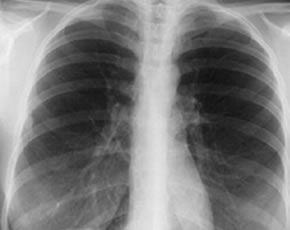TNFα inhibitors have demonstrated great efficacy for the treatment of rheumatoid arthritis (RA). However, they are not without potential side effects with one being the reactivation of latent tuberculosis (TB). This complication can be minimized by screening for latent TB prior to the initiation of a TNFα inhibitor and initiating treatment. Unfortunately, there is no gold standard by which to screen for latent TB. Tuberculin skin testing with purified protein derivative (PPD) is commonly used as a screen for TB before the initiation of TNFα inhibitors; although imperfections in the test (particularly for individuals already on immunosuppression) are not insignificant. The following study summarized below sought to compare the standard PPD test to the interferon-gamma release assay (IGRA) blood test for latent TB screening among patients with RA, psoriatic arthritis, or ankylosing spondylitis starting the TNFα inhibitor, golimumab [Hsia EC, et al. Interferon-gamma release assay versus tuberculin skin test prior to treatment with golimumab, a human anti-tumor necrosis factor antibody, in patients with rheumatoid arthritis, psoriatic arthritis or ankylosing spondylitis. Arthritis & Rheumatism 2012;64(7):2068-2077].
 Methods:
Methods:
Pooled data from patients who had undergone screening for TB with both the IGRA and PPD test while enrolled in 1 of 5 phase III randomized placebo-controlled clinical trials for golimumab were included in these analyses. The 5 pooled studies included patients with RA (early and previously treated with TNFα inhibitors), psoriatic arthritis, and ankylosing spondylitis. These were international trials, so a wide range of patients were represented. Patients were screened for eligibility in the trials with the same criteria which included 3 TB screening tests: standard PPD, IGRA, and a chest x-ray. Analyses for this study included concordance between the PPD and IGRA results overall, by known BCG vaccination status, and by geographic region. Logistic regression was also completed to evaluate for factors associated with the screening test results.
Results:
2303 patients with inflammatory arthritis were included in these analyses from the 5 pooled trials with a median age of 49 years. Almost half were from North America (41.8%) and were receiving corticosteroids (43.4%, median dose 5mg/day). 788 patients had received the BCG vaccine, and 255 had unknown BCG status. 317 patients (13.8%) began treatment for latent TB because of this testing. 99.1% of the patients had both IGRA and PPD testing. 13.8% of all 2282 patients had at least one TB screening test that was positive. 9.4% had positive PPDs, and 7.0% had positive IGRA, and 2.6% were positive on both. 1.8% had indeterminate results on IGRA. Among the patients positive by IGRA, 36.9% were also positive by PPD. Among the patients with a positive PPD, 27.4% were also positive by IGRA. The kappa coefficient for agreement between the 2 tests was 0.22 (95% CI 0.157-0.279). Among those with a known history of BCG vaccination, 15.2% had positive PPD testing compared to 9.1% with positive IGRA testing (p=<0.001). Factors associated with a positive IGRA by logistic regression were age (≥65 years) and geographic areas outside of North America. Individuals who received the BCG vaccine had a higher odds of a having a positive PPD than those who did not receive the vaccine (OR 2.47, 95% CI 1.71-3.55).
Conclusions:
With a kappa coefficient of 0.22 there was considerable discordance in the rate of positive results between PPD and IGRA testing. Among those with BCG vaccine, the rate of PPD positivity was significantly greater than IGRA positivity suggesting this may represent some false positive results with PPD in this population. These data suggest IGRA may provide greater specificity for latent TB among those with inflammatory arthritis than PPD.
Editorial Comment:
Screening for latent TB in patients with inflammatory arthritis who will be starting TNFα inhibitors is important to prevent complications of TB-reactivation. However, currently there is no ‘gold standard’ for the diagnosis of latent TB. PPD is a good option as it is inexpensive, easy to administer, and has been used as a screening test for over a century. But many of the short-comings of PPD, which are reviewed in this article, are important in a population with inflammatory arthritis – such as inaccuracies in immunosuppressed patients (leading to false-negative results) and those who have received BCG vaccination (leading to false-positive results). Hence, having another option for screening, such as IGRA, is a meaningful advance. Unfortunately, without a definitive ‘gold standard’ we are left having to make inferences about the performance of the IGRA test; hence results should be interpreted with caution.
 Methods:
Methods:
